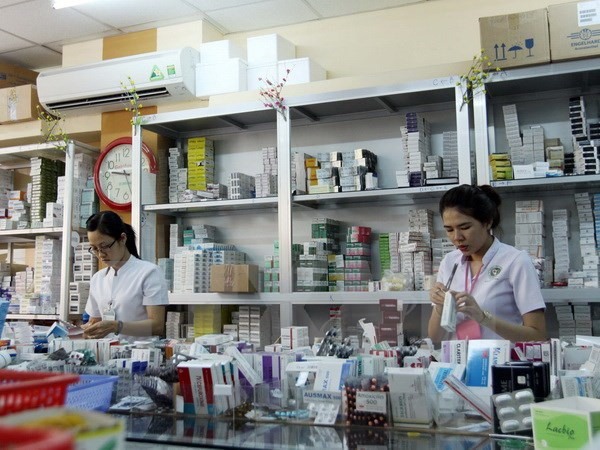 Society
Society

" />The number of bids for medicine and medical equipment has risen dramatically in HCM City, according to the city’s Health Department.
 |
| Bidding activities for medicine and medical equipment have increased in the last two weeks as a new government policy for transparent bidding, which aims to lower drug prices, has taken effect. — VNA/VNS Photo Phương Vy |
HCM CITY — The number of bids for medicine and medical equipment has risen dramatically in HCM City, according to the city’s Health Department.
Many of the bids, which are worth a total of thousands of billion of Vietnamese đồng, occurred in the past two weeks after the department selected the slate of potential pharmaceutical suppliers.
The bidding stages, including the hiring of consultants and preparation of bidding documents as well as financial arrangements, have also been completed, according to the department.
Last week, Thống Nhất Hospital in Tân Bình District announced that it would invite bids for three packages to buy medicine and medical equipment, including a bid package for generic drugs worth VNĐ600 billion (US$26.29 million). This attracted the attention of many pharmaceutical suppliers.
The other two bid packages include 309 kinds of special brand drugs (or the equivalent), with a total bidding package value of VNĐ260 billion (11 million).
Chợ Rẫy Hospital last week also invited bids for two packages to buy medical equipment, of which the bid security payment was already VNĐ600 million ($26,000).
Bidders have also been interested in three bidding packages from the HCM City Oncology Hospital to buy radioactive substances and marking compounds and other medical equipment with total value of VNĐ82 billion ($3.5 million).
Severe competition
Winning the bids can be highly profitable as the annual procurement value has reached thousands of billion of Vietnamese đồng, experts said. However, there is severe competition among contractors.
A representative of Minh Châu Health Co., Ltd, a major pharmaceutical company in HCM City, said: “Contractors must increase their capacity in terms of quality, service delivery, and, of course, price competition to be able to win the bid.”
At a recent bidding event for generic drugs by District 2 Hospital, 140 contractors submitted bids.
For a package of VNĐ142 billion (medium-sized package), this was considered a very high number, according to the hospital.
The hospital also invited bids for two other packages, including one to purchase special drugs and one to buy traditional medicine and herbs, with total bidding value of more than VNĐ45 billion.
The three packages at District 2 Hospital have attracted more than 30 tenders, including major contractors in Việt Nam and around the world such as Domesco, Bidiphar, Agimexpharm, Pymepharco, USS Pharma, Zuellig, Yteco and Bến Thành.
Bùi Mạnh Côn, director of An Bình Hospital, said that 121 contractors had submitted bids worth a total of VNĐ80 billion for one package.
During a tender event, a representative of the contractor, Mekong Company, said it had already participated in many bid packages.
“All of the packages have rigorous standards. Contractors must ensure many criteria, including GSP (Good Storage Practice), GDP (Good Distribution Practice) and GMP (Good Manufacturing Practice),” he said.
To win the bid, contractors have to prove their capability and experience, including the number of contracts they have signed, experience in production and business, and financial capacity of contractors.
“We have tried to offer the most competitive price,” said the company representative.
Three levels
According to the Health Ministry, drug bidding is being conducted at three levels in the country: national, provincial and hospital.
Việt Nam Social Security (VSS) is the State agency in charge of organising bidding.
The ministry said this year it would open national centralised bidding for 30 of the most commonly used drugs. It will also extend the list of drugs eligible to be bid at the provincial level.
In addition, the ministry will negotiate prices of eight types of highly used patented medicine.
Speaking at a recent meeting, Deputy Prime Minister Vương Đình Huệ, said that centralised drug bidding would be a vital solution to reduce drug prices.
Extending the list of biddable drugs would not only be economically beneficial but also a humanitarian imperative, especially to ensure that the poor can buy drugs without worry about price hikes, he said.
Huệ asked the Health Ministry to conduct open, transparent and competitive bidding on medical equipment and other supplies at some Health Ministry hospitals. — VNS




